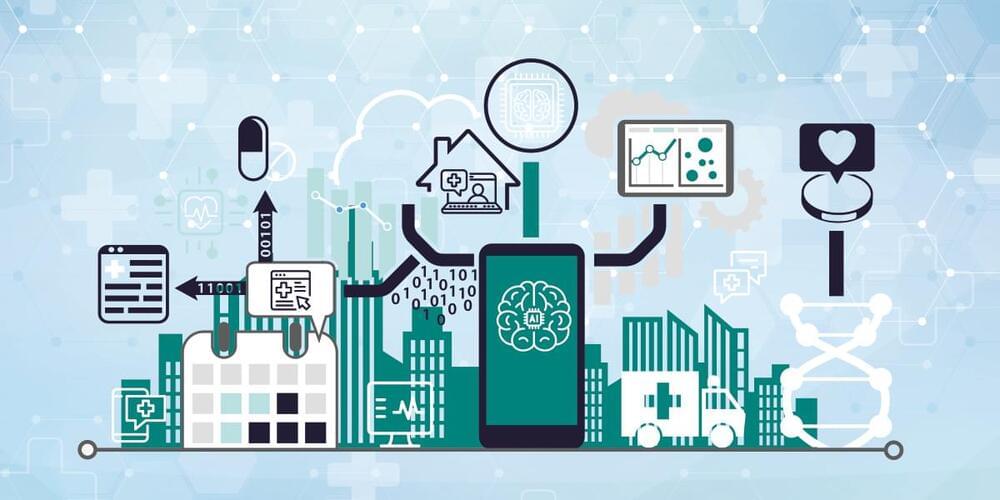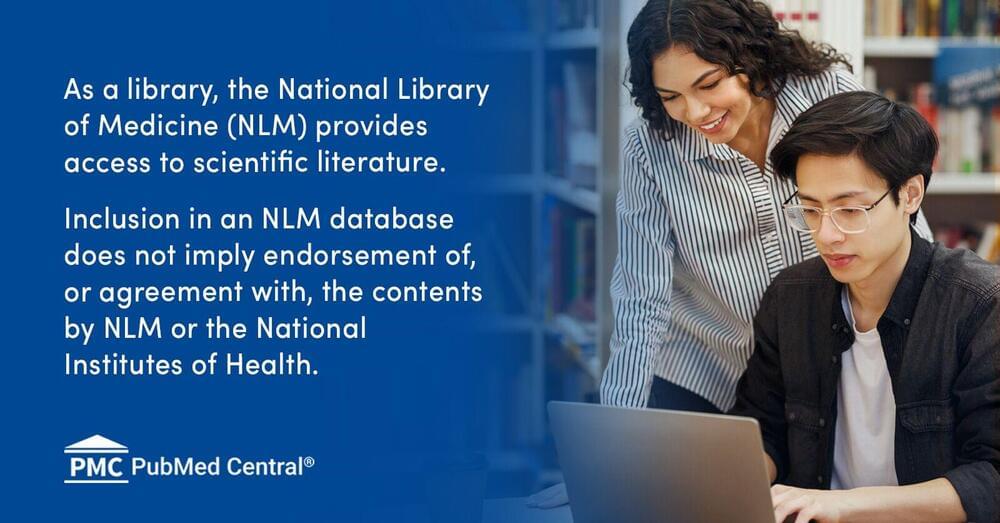China plans to broaden a ban on the use of iPhones in sensitive departments to state companies and government-backed agencies. Tom Mackenzie reports on Bloomberg Television.
——-
Follow Bloomberg for business news & analysis, up-to-the-minute market data, features, profiles and more: http://www.bloomberg.com.
Connect with us on… Twitter: https://twitter.com/business Facebook: https://www.facebook.com/bloombergbus… https://www.instagram.com/bloombergbu…
Twitter: https://twitter.com/business.
Facebook: https://www.facebook.com/bloombergbusiness.
Instagram: https://www.instagram.com/bloombergbusiness/
Category: business – Page 77

AI builds momentum for smarter health care
The pharmaceutical industry operates under one of the highest failure rates of any business sector. The success rate for drug candidates entering capital Phase 1 trials—the earliest type of clinical testing, which can take 6 to 7 years —is anywhere between 9% and 12%, depending on the year, with costs to bring a drug from discovery to market ranging from $1.5 billion to $2.5 billion, according to Science.

We’re All Programmers Now
Generative AI and other easy-to-use software tools can help employees with no coding background become adept programmers, or what the authors call citizen developers. By simply describing what they want in a prompt, citizen developers can collaborate with these tools to build entire applications—a process that until recently would have required advanced programming fluency.
Information technology has historically involved builders (IT professionals) and users (all other employees), with users being relatively powerless operators of the technology. That way of working often means IT professionals struggle to meet demand in a timely fashion, and communication problems arise among technical experts, business leaders, and application users.
Citizen development raises a critical question about the ultimate fate of IT organizations. How will they facilitate and safeguard the process without placing too many obstacles in its path? To reject its benefits is impractical, but to manage it carelessly may be worse. In this article the authors share a road map for successfully introducing citizen development to your employees.

North Korean hackers have allegedly stolen hundreds of millions in crypto to fund nuclear programs
North Korea-linked hackers have stolen hundreds of millions of crypto to fund the regime’s nuclear weapons programs, research shows.
So far this year, from January to Aug. 18, North Korea-affiliated hackers stole $200 million worth of crypto — accounting for over 20% of all stolen crypto this year, according to blockchain intelligence firm TRM Labs.
“In recent years, there has been a marked rise in the size and scale of cyber attacks against cryptocurrency-related businesses by North Korea. This has coincided with an apparent acceleration in the country’s nuclear and ballistic missile programs,” said TRM Labs in a June discussion with North Korea experts.
Huawei Teardown Reveals China Chip Breakthrough
Huawei and China’s top chipmaker have built an advanced 7-nanometer processor to power its latest smartphone, a sign Beijing is making early progress in a nationwide push to circumvent US efforts to contain its ascent. Peter Elstrom reports on Bloomberg Television.
——-
Follow Bloomberg for business news & analysis, up-to-the-minute market data, features, profiles and more: http://www.bloomberg.com.
Connect with us on… Twitter: https://twitter.com/business Facebook: https://www.facebook.com/bloombergbus… https://www.instagram.com/bloombergbu…
Twitter: https://twitter.com/business.
Facebook: https://www.facebook.com/bloombergbusiness.
Instagram: https://www.instagram.com/bloombergbusiness/

Legal Liability for Insecure Software Might Work, but It’s Dangerous
Ensuring security in the software market is undeniably crucial, but it is important to strike a balance that avoids excessive government regulation and the burdens associated with government-mandated legal responsibility, also called a liability regime. While there’s no question the market is broken with regards to security, and intervention is necessary, there is a less intrusive approach that enables the market to find the right level of security while minimizing the need for heavy-handed government involvement.
Imposing a liability regime on software companies may go too far and create unintended consequences. The downsides of liability, such as increased costs, potential legal battles, and disincentives to innovation, can hinder the development of secure software without necessarily guaranteeing improved security outcomes. A liability regime could also burden smaller companies disproportionately and stifle the diversity and innovation present in the software industry.
Instead, a more effective approach involves influencing the software market through measures that encourage transparency and informed decision-making. By requiring companies to be fully transparent about their security practices, consumers and businesses can make informed choices based on their risk preferences. Transparency allows the market to drive the demand for secure software, enabling companies with robust security measures to potentially gain a competitive edge.
A ‘people-first’ view of the AI economy
Today marks nine months since ChatGPT was released, and six weeks since we announced our AI Start seed fund. Based on our conversations with scores of inception and early-stage AI founders, and hundreds of leading CXOs (chief experience officers), I can attest that we are definitely in exuberant times.
In the span of less than a year, AI investments have become de rigueur in any portfolio, new private company unicorns are being created every week, and the idea that AI will drive a stock market rebound is taking root. People outside of tech are becoming familiar with new vocabulary.
Large language models. ChatGPT. Deep-learning algorithms. Neural networks. Reasoning engines. Inference. Prompt engineering. CoPilots. Leading strategists and thinkers are sharing their view on how it will transform business, how it will unlock potential, and how it will contribute to human flourishing.

The potential for artificial intelligence in healthcare
The complexity and rise of data in healthcare means that artificial intelligence (AI) will increasingly be applied within the field. Several types of AI are already being employed by payers and providers of care, and life sciences companies. The key categories of applications involve diagnosis and treatment recommendations, patient engagement and adherence, and administrative activities. Although there are many instances in which AI can perform healthcare tasks as well or better than humans, implementation factors will prevent large-scale automation of healthcare professional jobs for a considerable period. Ethical issues in the application of AI to healthcare are also discussed.
KEYWORDS: Artificial intelligence, clinical decision support, electronic health record systems.
Artificial intelligence (AI) and related technologies are increasingly prevalent in business and society, and are beginning to be applied to healthcare. These technologies have the potential to transform many aspects of patient care, as well as administrative processes within provider, payer and pharmaceutical organisations.
How cyber-crime has become organised warfare | Four Corners
Every seven minutes a cyber-attack is reported in Australia.
Millions of Australians have had their data stolen in malicious attacks, costing some businesses tens of millions of dollars in ransom. The federal government is warning the country must brace for even more strikes as cyber gangs become more sophisticated and ruthless.
Four Corners investigates the cyber gangs behind these assaults, cracking open their inner operations and speaking to a hacker who says he targets Australians and shows no remorse.
The program travels all the way to Ukraine and discovers we share a common enemy in the battle for cyber security.

Google Launches Tool That Detects AI Images In Effort To Curb Deepfakes
Fake images and misinformation in the age of AI are growing. Even in 2019, a Pew Research Center study found that 61% of Americans said it is too much to ask of the average American to be able to recognize altered videos and images. And that was before generative AI tools became widely available to the public.
AdobeADBE +0.5% shared August 2023 statistics on the number of AI-generated images created with Adobe Firefly reaching one billion, only three months after it launched in March 2023.
In response to the increasing use of AI images, Google Deep Mind announced a beta version of SynthID. The tool will watermark and identify AI-generated images by embedding a digital watermark directly into the pixels of an image that will be imperceptible to the human eye but detectable for identification.
Kris Bondi, CEO and founder of Mimoto, a proactive detection and response cybersecurity company, said that while Google’s SynthID is a starting place, the problem of deep fakes will not be fixed by a single solution.
“People forget that bad actors are also in business. Their tactics and technologies continuously evolve, become available to more bad actors, and the cost of their techniques, such as deep fakes, comes down,” said Bondi.